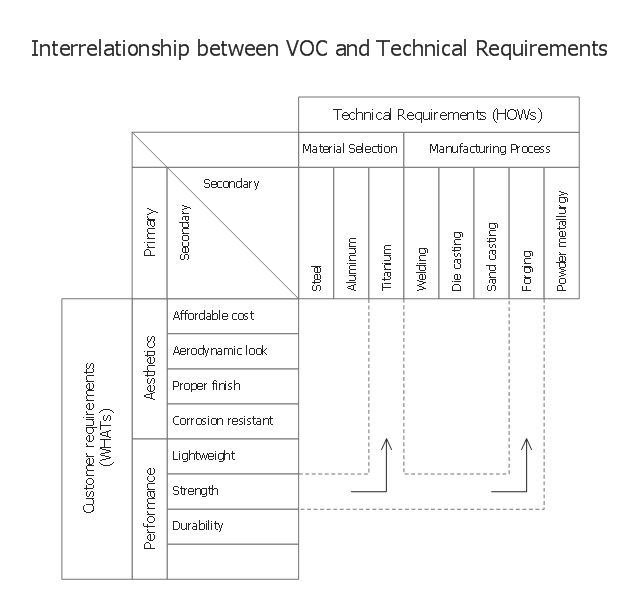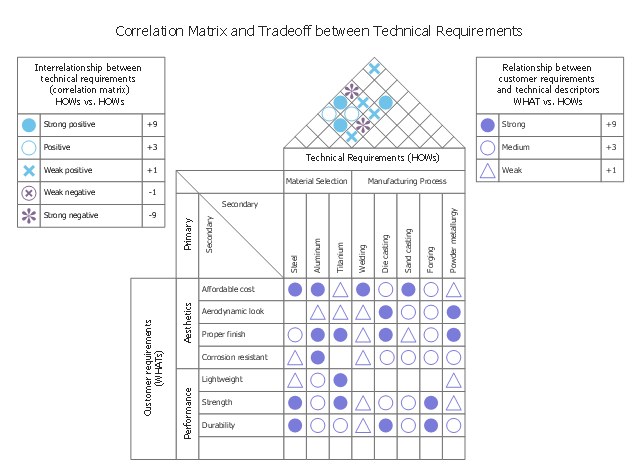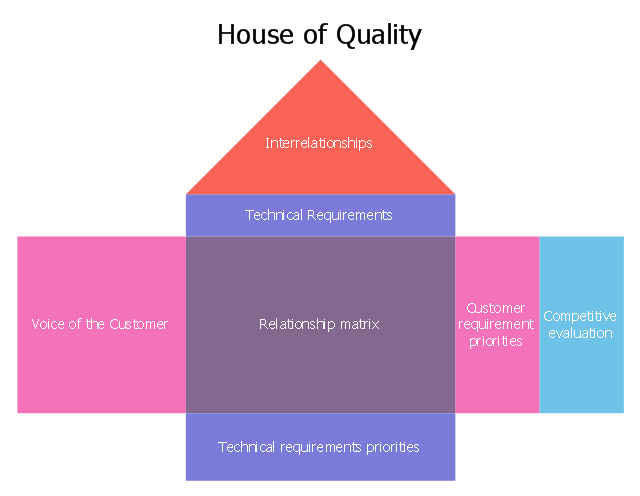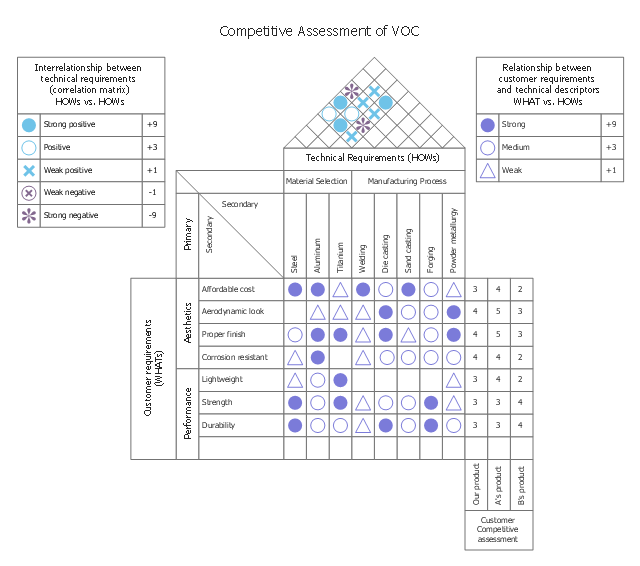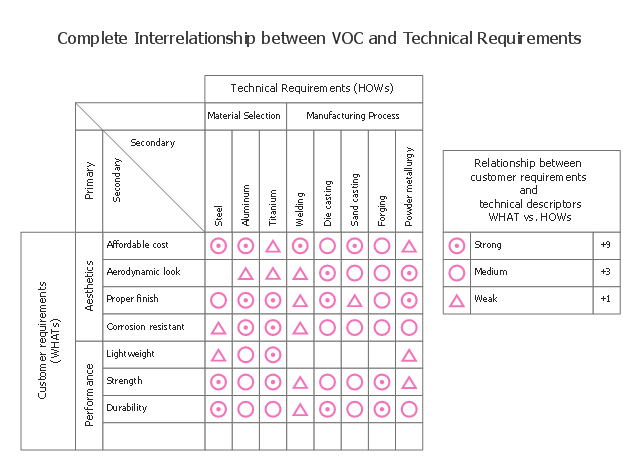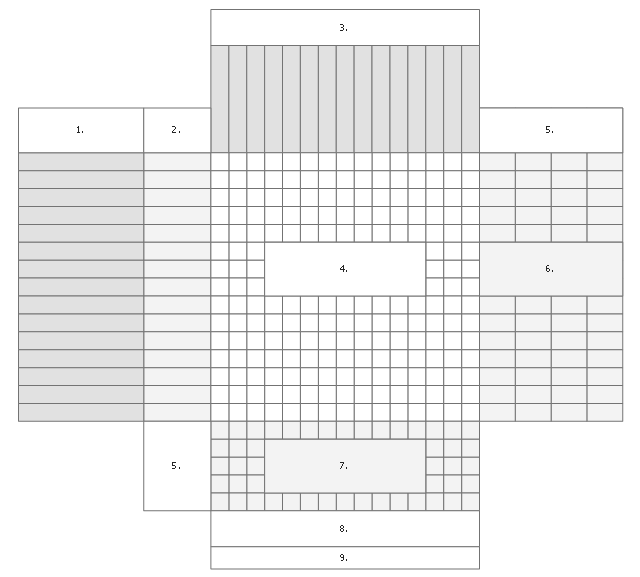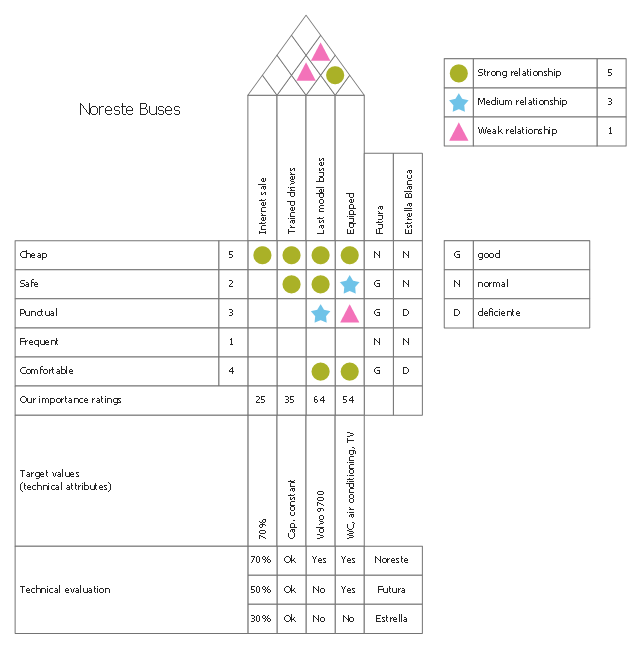 House of Quality
House of Quality
House of Quality solution provides the powerful drawing tools, numerous specific samples and examples, and set of vector design elements of House of Quality shapes and symbols, which will help you in application the Quality function deployment (QFD) methodology and in easy creation the House of Quality Matrices intended for satisfaction the consumers' desires and requirements, for representing them in a visual way and then transformation into the targets and technical requirements to be followed for development the best products.
House of Quality Matrix Software
House of Quality Matrix Software - Use the predesigned objects from the Involvement Matrix Objects Library from the Seven Management and Planning Tools Solution to create professional looking House of Quality Matrices in minutes.This house of quality sample illustrates VOC vs. technical requirements.
It was designed on the base of the figure 3-3 in Lecture "How QFD helps in product quality improvement?" from the website of National Programme on Technology Enhanced
Learning (NPTEL), India. [nptel.ac.in/ courses/ 110101010/ downloads/ mod3/ Module%20 III-Lec1.pdf]
Distributed under Creative Commons Attribution-ShareAlike 4.0 International (CC BY-SA 4.0) [creativecommons.org/ licenses/ by-sa/ 4.0/ ]
"As the customer needs and expectations are expressed in terms of customer requirements, the QFD team needs to come up with engineering characteristics (HOW’s) that will affect one or more of the customer requirements. Each engineering characteristic must directly affect a customer perception (VOC) and be expressed in measurable terms.
Implementation of the customer requirements in design is difficult until they are translated into counterpart technical characteristics. Counterpart technical characteristics are an expression of the voice of the customer in technical language and specifications. For example, a customer requirement for an automobile might be a smooth ride. This is rather an abstract statement, which is important from the point of view of selling an automobile. Technical characteristics for a smooth ride can be appropriate dampening, anti-roll, and stability requirements. These are the primary technical descriptors or characteristics. Engineering knowledge and brainstorming among engineering staff’s is a suggested method for determining technical characteristics. Figure 3-3 shows the different technical requirements which can address all VOC for the bike stem design." [nptel.ac.in/ courses/ 110101010/ modules/ module3/ lec1/ 1.5.html]
The HOQ example "House of Quality - VOC vs. Technical Requirements" was designed using ConceptDraw PRO software extended with House of Quality solution from Quality area of ConceptDraw PRO Solution Park.
It was designed on the base of the figure 3-3 in Lecture "How QFD helps in product quality improvement?" from the website of National Programme on Technology Enhanced
Learning (NPTEL), India. [nptel.ac.in/ courses/ 110101010/ downloads/ mod3/ Module%20 III-Lec1.pdf]
Distributed under Creative Commons Attribution-ShareAlike 4.0 International (CC BY-SA 4.0) [creativecommons.org/ licenses/ by-sa/ 4.0/ ]
"As the customer needs and expectations are expressed in terms of customer requirements, the QFD team needs to come up with engineering characteristics (HOW’s) that will affect one or more of the customer requirements. Each engineering characteristic must directly affect a customer perception (VOC) and be expressed in measurable terms.
Implementation of the customer requirements in design is difficult until they are translated into counterpart technical characteristics. Counterpart technical characteristics are an expression of the voice of the customer in technical language and specifications. For example, a customer requirement for an automobile might be a smooth ride. This is rather an abstract statement, which is important from the point of view of selling an automobile. Technical characteristics for a smooth ride can be appropriate dampening, anti-roll, and stability requirements. These are the primary technical descriptors or characteristics. Engineering knowledge and brainstorming among engineering staff’s is a suggested method for determining technical characteristics. Figure 3-3 shows the different technical requirements which can address all VOC for the bike stem design." [nptel.ac.in/ courses/ 110101010/ modules/ module3/ lec1/ 1.5.html]
The HOQ example "House of Quality - VOC vs. Technical Requirements" was designed using ConceptDraw PRO software extended with House of Quality solution from Quality area of ConceptDraw PRO Solution Park.
This house of quality sample illustrates correlation matrix.
It was designed on the base of the figure 3-5 in Lecture "How QFD helps in product quality improvement?" from the website of National Programme on Technology Enhanced Learning (NPTEL), India. [nptel.ac.in/ courses/ 110101010/ downloads/ mod3/ Module%20 III-Lec1.pdf]
Distributed under Creative Commons Attribution-ShareAlike 4.0 International (CC BY-SA 4.0) [creativecommons.org/ licenses/ by-sa/ 4.0/ ]
"After drafting the relationship matrix, it is evaluated for any empty row or column. An empty row indicates that a customer voice is not being addressed by any technical descriptors. Thus, the customer expectation is not being met. Any blank column indicates that the technical requirement is unnecessary, as it does not address any VOC.
The roof of the house of quality, expressed as correlation matrix, is used to identify any interrelationships between the technical descriptors (Figure 3-5). Symbols are used to describe the strength of the interrelationships. Symbols generally preferred are:
- A ‘solid circle’ represents a strong positive relationship.
- A ‘circle’ represents a positive relationship.
- An ‘X’ represents a negative relationship.
- An ‘asterisk’ represents a strong negative relationship." [nptel.ac.in/ courses/ 110101010/ modules/ module3/ lec1/ 1.7.html]
The HOQ example "House of Quality - correlation matrix" was designed using ConceptDraw PRO software extended with House of Quality solution from Quality area of ConceptDraw PRO Solution Park.
It was designed on the base of the figure 3-5 in Lecture "How QFD helps in product quality improvement?" from the website of National Programme on Technology Enhanced Learning (NPTEL), India. [nptel.ac.in/ courses/ 110101010/ downloads/ mod3/ Module%20 III-Lec1.pdf]
Distributed under Creative Commons Attribution-ShareAlike 4.0 International (CC BY-SA 4.0) [creativecommons.org/ licenses/ by-sa/ 4.0/ ]
"After drafting the relationship matrix, it is evaluated for any empty row or column. An empty row indicates that a customer voice is not being addressed by any technical descriptors. Thus, the customer expectation is not being met. Any blank column indicates that the technical requirement is unnecessary, as it does not address any VOC.
The roof of the house of quality, expressed as correlation matrix, is used to identify any interrelationships between the technical descriptors (Figure 3-5). Symbols are used to describe the strength of the interrelationships. Symbols generally preferred are:
- A ‘solid circle’ represents a strong positive relationship.
- A ‘circle’ represents a positive relationship.
- An ‘X’ represents a negative relationship.
- An ‘asterisk’ represents a strong negative relationship." [nptel.ac.in/ courses/ 110101010/ modules/ module3/ lec1/ 1.7.html]
The HOQ example "House of Quality - correlation matrix" was designed using ConceptDraw PRO software extended with House of Quality solution from Quality area of ConceptDraw PRO Solution Park.
This house of quality matrix sample was designed on the base of the Wikimedia Commons file: House of Quality.jpg.
[commons.wikimedia.org/ wiki/ File:House_ of_ Quality.jpg]
This file is licensed under the Creative Commons Attribution-Share Alike 4.0 International license. [creativecommons.org/ licenses/ by-sa/ 4.0/ deed.en]
"Quality Function Deployment (QFD) uses a matrix format to capture a number of issues that are vital to the planning process. The House of Quality Matrix is the most recognized and widely used form of this method. It translates customer requirements, based on marketing research and benchmarking data, into an appropriate number of engineering targets to be met by a new product design. Basically, it is the nerve center and the engine that drives the entire QFD process." [Tapke, Jennifer; Muller, Alyson; Johnson, Greg; Siec, Josh. "House of Quality: Steps in Understanding the House of Quality" (PDF). IE 361. Iowa State University. www.public.iastate.edu/ ~vardeman/ IE361/ f01mini/ johnson.pdf]
The HOQ example "House of quality" was designed using ConceptDraw PRO software extended with House of Quality solution from Quality area of ConceptDraw PRO Solution Park.
[commons.wikimedia.org/ wiki/ File:House_ of_ Quality.jpg]
This file is licensed under the Creative Commons Attribution-Share Alike 4.0 International license. [creativecommons.org/ licenses/ by-sa/ 4.0/ deed.en]
"Quality Function Deployment (QFD) uses a matrix format to capture a number of issues that are vital to the planning process. The House of Quality Matrix is the most recognized and widely used form of this method. It translates customer requirements, based on marketing research and benchmarking data, into an appropriate number of engineering targets to be met by a new product design. Basically, it is the nerve center and the engine that drives the entire QFD process." [Tapke, Jennifer; Muller, Alyson; Johnson, Greg; Siec, Josh. "House of Quality: Steps in Understanding the House of Quality" (PDF). IE 361. Iowa State University. www.public.iastate.edu/ ~vardeman/ IE361/ f01mini/ johnson.pdf]
The HOQ example "House of quality" was designed using ConceptDraw PRO software extended with House of Quality solution from Quality area of ConceptDraw PRO Solution Park.
This house of quality sample illustrates competative assessment of voice of the customer (VOC).
It was designed on the base of the figure 3-6 in Lecture "How QFD helps in product quality improvement?" from the website of National Programme on Technology Enhanced
Learning (NPTEL), India. [nptel.ac.in/ courses/ 110101010/ downloads/ mod3/ Module%20 III-Lec1.pdf]
Distributed under Creative Commons Attribution-ShareAlike 4.0 International (CC BY-SA 4.0) [creativecommons.org/ licenses/ by-sa/ 4.0/ ]
"The customer’s competitive assessment (Figure 3-6) is a pair of table (or graph) that depicts how competitive products compare with current organization product status on specific VOC. The customer competitive assessment is the block of columns corresponding to each customer requirement in the house of quality on the right side of the relationship matrix, The numbers 1 through 5 are listed in the competitive evaluation column to indicate a rating of 1 for worst and 5 for best. The customer competitive assessment is a good way to determine if the customer voice has been met (as compared to best competitor) and identify areas to improvement for future design." [nptel.ac.in/ courses/ 110101010/ modules/ module3/ lec1/ 1.8.html]
The HOQ example "House of Quality - customer’s competitive assessment" was designed using ConceptDraw PRO software extended with House of Quality solution from Quality area of ConceptDraw PRO Solution Park.
It was designed on the base of the figure 3-6 in Lecture "How QFD helps in product quality improvement?" from the website of National Programme on Technology Enhanced
Learning (NPTEL), India. [nptel.ac.in/ courses/ 110101010/ downloads/ mod3/ Module%20 III-Lec1.pdf]
Distributed under Creative Commons Attribution-ShareAlike 4.0 International (CC BY-SA 4.0) [creativecommons.org/ licenses/ by-sa/ 4.0/ ]
"The customer’s competitive assessment (Figure 3-6) is a pair of table (or graph) that depicts how competitive products compare with current organization product status on specific VOC. The customer competitive assessment is the block of columns corresponding to each customer requirement in the house of quality on the right side of the relationship matrix, The numbers 1 through 5 are listed in the competitive evaluation column to indicate a rating of 1 for worst and 5 for best. The customer competitive assessment is a good way to determine if the customer voice has been met (as compared to best competitor) and identify areas to improvement for future design." [nptel.ac.in/ courses/ 110101010/ modules/ module3/ lec1/ 1.8.html]
The HOQ example "House of Quality - customer’s competitive assessment" was designed using ConceptDraw PRO software extended with House of Quality solution from Quality area of ConceptDraw PRO Solution Park.
This house of quality sample illustrates interrelationship matrix.
It was designed on the base of the figure 3-4 in Lecture "How QFD helps in product quality improvement?" from the website of National Programme on Technology Enhanced
Learning (NPTEL), India. [nptel.ac.in/ courses/ 110101010/ downloads/ mod3/ Module%20 III-Lec1.pdf]
Distributed under Creative Commons Attribution-ShareAlike 4.0 International (CC BY-SA 4.0) [creativecommons.org/ licenses/ by-sa/ 4.0/ ]
"The next step in building a house of quality is to compare the VOC with technical characteristics and determine their interrelationships. In this context, engineering knowledge about the product and historic evidence/ data can provide useful information. Common practice is to use symbols to represent the nature of relationship between customer requirements and technical descriptors. Symbols used are:
- A solid circle represents a strong relationship (scored as +9).
- A single circle represents a medium relationship. (scored as +3).
- A triangle represents a weak relationship (scored as +1).
- The box is left blank if there is no relationship between VOC and technical characteristics.
Figure 3-4 provides the interrelationship matrix with type of relationships. Any cell that is empty implies no or insignificant relationship." [nptel.ac.in/ courses/ 110101010/ modules/ module3/ lec1/ 1.6.html]
The HOQ example "House of Quality - interrelationship matrix" was designed using ConceptDraw PRO software extended with House of Quality solution from Quality area of ConceptDraw PRO Solution Park.
It was designed on the base of the figure 3-4 in Lecture "How QFD helps in product quality improvement?" from the website of National Programme on Technology Enhanced
Learning (NPTEL), India. [nptel.ac.in/ courses/ 110101010/ downloads/ mod3/ Module%20 III-Lec1.pdf]
Distributed under Creative Commons Attribution-ShareAlike 4.0 International (CC BY-SA 4.0) [creativecommons.org/ licenses/ by-sa/ 4.0/ ]
"The next step in building a house of quality is to compare the VOC with technical characteristics and determine their interrelationships. In this context, engineering knowledge about the product and historic evidence/ data can provide useful information. Common practice is to use symbols to represent the nature of relationship between customer requirements and technical descriptors. Symbols used are:
- A solid circle represents a strong relationship (scored as +9).
- A single circle represents a medium relationship. (scored as +3).
- A triangle represents a weak relationship (scored as +1).
- The box is left blank if there is no relationship between VOC and technical characteristics.
Figure 3-4 provides the interrelationship matrix with type of relationships. Any cell that is empty implies no or insignificant relationship." [nptel.ac.in/ courses/ 110101010/ modules/ module3/ lec1/ 1.6.html]
The HOQ example "House of Quality - interrelationship matrix" was designed using ConceptDraw PRO software extended with House of Quality solution from Quality area of ConceptDraw PRO Solution Park.
This house of quality matrix template was designed on the base of the Wikimedia Commons file: House of quality 9 step.png.
"An example of House of Quality including numbers (1-9) for easier relation between text and image."
[commons.wikimedia.org/ wiki/ File:House_ of_ quality_ 9_ step.png]
"Product Design. Initially, information about customer requirements must be collected. Once done, these should be converted into qualitative properties in the form of design. A tool used to facilitate this is the House of Quality, which is based on a number of processes that generally follow the list below.
1. Customer characteristics
2. Priorities of customer characteristics (scale 1-5)
3. Technical characteristics
4. Relationships between customer and technical characteristics (1.3.9)
5. Competing products
6. Rating of products on the market by customer characteristics (scale 1-5)
7. Rating of products on the market by technical characteristics (scale 1-5)
8. Rating and comparison of measurable values for product properties
9. The tool converts the information into measurable results
Then a more precise requirement specification can be made. Where product requirements and technical characteristics are developed in detail." [sv.wikipedia.org/ wiki/ Quality_ function_ deployment]
The HOQ template "House of quality 9 step" was designed using ConceptDraw PRO software extended with House of Quality solution from Quality area of ConceptDraw PRO Solution Park.
"An example of House of Quality including numbers (1-9) for easier relation between text and image."
[commons.wikimedia.org/ wiki/ File:House_ of_ quality_ 9_ step.png]
"Product Design. Initially, information about customer requirements must be collected. Once done, these should be converted into qualitative properties in the form of design. A tool used to facilitate this is the House of Quality, which is based on a number of processes that generally follow the list below.
1. Customer characteristics
2. Priorities of customer characteristics (scale 1-5)
3. Technical characteristics
4. Relationships between customer and technical characteristics (1.3.9)
5. Competing products
6. Rating of products on the market by customer characteristics (scale 1-5)
7. Rating of products on the market by technical characteristics (scale 1-5)
8. Rating and comparison of measurable values for product properties
9. The tool converts the information into measurable results
Then a more precise requirement specification can be made. Where product requirements and technical characteristics are developed in detail." [sv.wikipedia.org/ wiki/ Quality_ function_ deployment]
The HOQ template "House of quality 9 step" was designed using ConceptDraw PRO software extended with House of Quality solution from Quality area of ConceptDraw PRO Solution Park.
This house of quality matrix sample was designed on the base of the Wikimedia Commons file: Casa de la calidad QFD.png.
[commons.wikimedia.org/ wiki/ File:A1_ House_ of_ Quality.png]
This file is made available under the Creative Commons CC0 1.0 Universal Public Domain Dedication. [creativecommons.org/ publicdomain/ zero/ 1.0/ deed.en]
"The house of quality, a part of QFD, identifies and classifies customer desires, identifies the importance of those desires, identifies engineering characteristics which may be relevant to those desires, correlates the two, allows for verification of those correlations, and then assigns objectives and priorities for the system requirements. This process can be applied at any system composition level (e.g. system, subsystem, or component) in the design of a product, and can allow for assessment of different abstractions of a system." [Quality function deployment. Wikipedia]
The HOQ example "House of quality of buses" was designed using ConceptDraw PRO software extended with House of Quality solution from Quality area of ConceptDraw PRO Solution Park.
[commons.wikimedia.org/ wiki/ File:A1_ House_ of_ Quality.png]
This file is made available under the Creative Commons CC0 1.0 Universal Public Domain Dedication. [creativecommons.org/ publicdomain/ zero/ 1.0/ deed.en]
"The house of quality, a part of QFD, identifies and classifies customer desires, identifies the importance of those desires, identifies engineering characteristics which may be relevant to those desires, correlates the two, allows for verification of those correlations, and then assigns objectives and priorities for the system requirements. This process can be applied at any system composition level (e.g. system, subsystem, or component) in the design of a product, and can allow for assessment of different abstractions of a system." [Quality function deployment. Wikipedia]
The HOQ example "House of quality of buses" was designed using ConceptDraw PRO software extended with House of Quality solution from Quality area of ConceptDraw PRO Solution Park.
- House Of Quality Examples
- House of Quality Matrix Software | Affinity Diagram | Property ...
- House of Quality Matrix Software | TQM Diagram Example ...
- Example House Of Quality
- New House of Quality Solution for ConceptDraw PRO
- House of Quality Matrix Software | Critical Path Method in ...
- House of Quality Matrix Software | Hoq Software
- ConceptDraw Solution Park | House Of Quality On Restaurant Design
- Total Quality Management Density | Relationships Analysis | House ...

